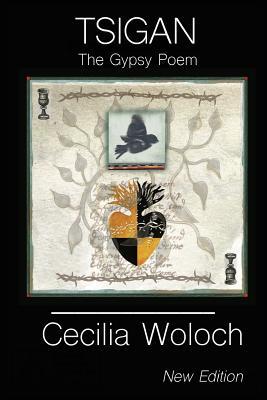This New Edition of Tsigan includes new poems by Cecilia Woloch reflecting the ongoing saga of the Roma people and includes an expanded and updated timeline based on her new research.
Praise for Tsigan: The Gypsy Poem:
I read and reread it with admiration, indeed, but also with gratitude for the realization, the authenticity of its wandering fire. What depth and scope are given here to the very image of Tsigan, the Gypsy, until it becomes the spirit itself. --W.S Merwin
A lyrical journey through history and memory so beautiful that at times it belies the deep pain it represents. Woloch takes us through fragments of memory that give glimpses into a life-long struggle with a hidden identity. Before I read Tsigan: The Gypsy Poem, I knew what had happened to Gypsies across the ages - I knew the detail of their persecution under the Nazis; their gassing at Auschwitz - but now I understand it completely differently. Now I feel it as if I had lived it. Poetry so tender allows one to be led by the hand through an anguished and otherwise unapproachable world with dignity and love. Tsigan: The Gypsy Poem gives us time and space to breathe, to live the arc of history and be present in every age, and to take a personal journey into the deep struggle of memory and identity. It's difficult to say that reading about five hundred years of Gypsy persecution left me profoundly enriched, but there is no other way to describe how I feel. Woloch took me on a personal journey as seeker, historian, guide, storyteller. Touchingly authentic. --Stephen D. Smith, Executive Director, USC Shoah Foundation Institute
Cecilia Woloch both eulogizes and celebrates the lives of Gypsies, a people who, through diasporas and a history of persecution, have endured centuries of dispossession, exile, poverty and extermination. What is extraordinary and profoundly compelling in this book-length poetic meditation is how skillfully Woloch intertwines her personal journey of identity with the larger forces in the world that have shaped the Roma people's fate and fortunes. --Maurya Simon
It has been said that poets write to give voice to those who do not speak for themselves. Cecilia Woloch does this in Tsigan: The Gypsy Poem, and more. She gives form to her own urge for historical and personal identity. Her voice sings through free verse, prose poems, and a relentless beating rhythm of primary accents that underscore the abuses of Gypsies throughout western civilization where the soul of the Gypsy has been pursued to near extinction. But through the words of Woloch, Gypsy lives are caught in burning imagery for longer than a flash on the page. --Sylvia Melville
I can't think of anyone who writes like Cecilia Woloch. As she says quoting Isabel Fonseca, "among Gypsies, continual self-reinvention has been the primary tool of survival." In Tsigan: The Gypsy Poem, Cecilia Woloch reinvents herself as a Gypsy fire of language, a "single word" set flaming as a daring, dancing lyric conflagration in the reader's hand. --Carol Muske-Dukes
Upon the blank page of her grandmother's, and every Gypsy's death, Cecilia Woloch writes her own story. Haunted. Unsettled. Gorgeously so. --Ralph Angel
